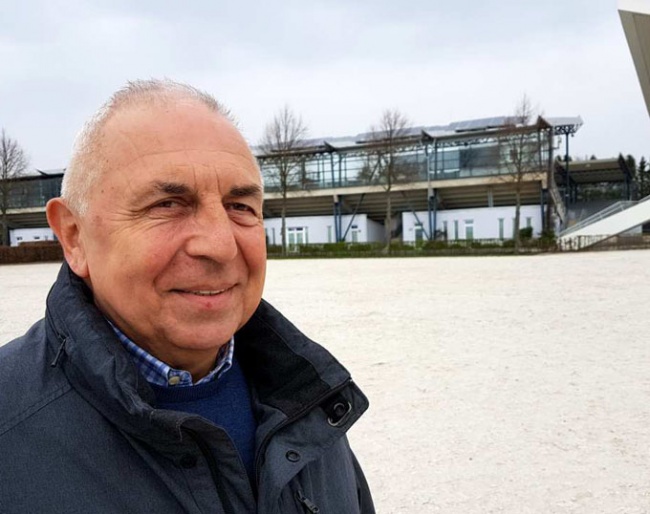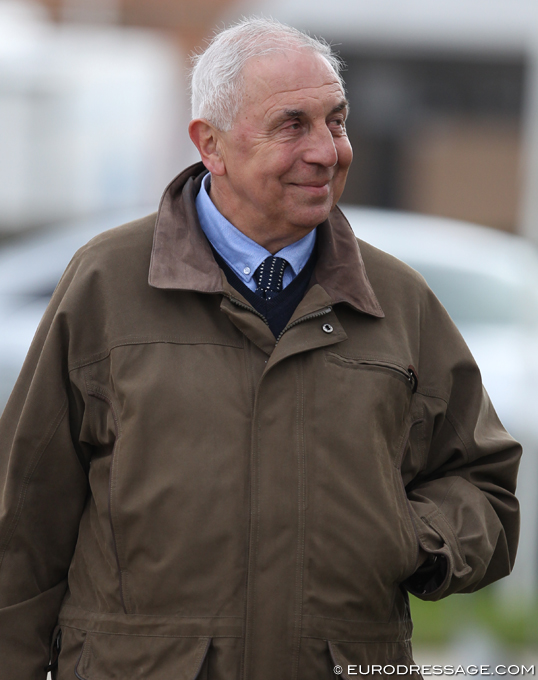
Belgian Jacques van Daele is a 4* FEI dressage judge and is the chief steward at the 2019 CHIO Aachen.
After an incident last year, the show organisation wants to prevent negative press on social media on riding in the warm-up not according to the definitions of classical dressage. It has therefore decided to make the sport more transparent, by putting “info stewards” as contact partners on the dressage warm-up areas to provide the spectators with information if wanted.
The CHIO Aachen press office also sent out this interview with FEI Chief Steward Jacques Van Daele in the lead-up to the 2019 Aachen edition, which starts on Wednesday 17 July 2019.
CHIO Aachen Interview: "Integrity is the Most Important Thing"
At the CHIO Aachen last year the best dressage riders in the world impressed the spectators with fantastic sport and fair riding almost without exception. Almost. However, there was also some criticism about scenes on the warm-up area: The accusation: horse-unfriendly riding, the result: discussions, accusations and insults across the social media.
The FEI stewards are responsible for making sure the regulations are observed.
What are your tasks in your capacity as Chief Steward?
Jacques Van Daele: Accompanying the riders – being there, in the stables, on the warm-up areas and the routes in-between. Watching and supervising everything that happens there.
What do these controls look like?
Van Daele: That is clearly stated in the regulations. It is laid down what is allowed and what isn’t. If everyone sticks to the rules it is simple.
And? And does everyone abide by the rules?
Van Daele: Today, the situation is clear, the dressage sport has developed further, it has changed. A too low neck position is no longer accepted, not by the press and definitely not by the public. The riders simply don’t ride the same way they did 20 years ago. Most of the riders have understood this for a long time now, but I must say, unfortunately, not all of them. And we have to work on this together.
So you are saying, the riders are aware that the sport has changed?
Van Daele: Yes, of course! Sure! In most countries.
But that also means not everywhere yet?
Van Daele: There are still exceptions. A few people are not quite convinced yet – but that will come in time! I will continue to stay cool and talk to the few riders concerned. And if it really doesn’t work, then we have to take a different approach – which I don’t like to have to do at all.
That means?
Van Daele: I did in fact have a few difficulties with riders in the past. They didn’t understand why they had been given a yellow card. In that case, I try to explain why. I take plenty of time to do so, an hour, an hour and a half. They don’t have to agree with what I say, but they at least have to listen to why I have said, “Excuse me…”. We are not enemies, but when things go too far, they go too far.
Can you describe your work in practice?
Van Daele: Talking, talking, talking. The people I work with are the riders. We talk a lot and often; not always on the practice arenas, also in the stables and after or before the warm-up. And if I can spend a weekend without cautioning anyone or handing out any yellow cards, then we all find it much better.
Should the stewards perhaps reactive more proactively? In other words, intervene more strongly? Already showing the yellow card on the warm-up area? To also signal to the outside world that something is happening?
Van Daele: We do intervene, react and also let the riders know that, but yes, perhaps we haven’t demonstrated that clearly enough to the outside. I always say to my stewards: “Don’t shout! Go over and say what has to be said.” And if that doesn’t help – then I am there. I am always there.

Van Daele: Yes, that helps so much. There are riders, who I get on very well with, but there are also difficult riders. It is not always just easy – it can be hard sometimes.
Does your training as a criminal investigation detective help you deal with these difficult cases?
Van Daele: Yes, a great deal, indeed.
Because one lets the other person finish speaking…
Van Daele: And respects and listens to him! Instead of just preparing the answer without really listening. Namely, that is when one starts arguing. If the people are worked up, I say: “Wait half an hour and then we will talk. That works in 90 percent of the cases. For me integrity is the most important attribute – say what one does, and do what one says.
Do you think your work is going to be different this year compared to last year’s CHIO?
Van Daele: The most important thing will be to make it clear that we are actually doing something. The spectators probably thought: They are just sitting around… This year the stewards are going to be wearing bibs so that they are immediately recognizable. And it is quite clear: Not everything was right last year, we reacted too late on one occasion and that was my fault. If somebody doesn’t ride fairly, we will discuss the matter. Not afterwards, but indeed immediately.
Are you looking forward to the CHIO?
Van Daele: Of course! Why not? You know, last year wasn’t my highlight, but it would be wrong to quit now. That is not my style. I can only do my work as well as I can and try to motivate everyone in the team to do the same. And if a rider says a simple “thank you” before heading home. Just “thank you” – then I am happy. Then, I always respond: “Don’t thank me. Thank my team!”
Photos © CHIOAAchen - Astrid Appels
Related Links
"Info Stewards" as Contact Persons at the Warm-Up during 2019 CDIO Aachen
Yellow Card for Madeleine Witte-Vrees at 2018 CDIO Aachen
Torricelli Tests Negative to Doping or Controlled Medication at 2012 CDIO Aachen
Lotje Schoots Reprimanded by FEI Steward at 2012 CDIO Aachen
What's Happening: August 2005